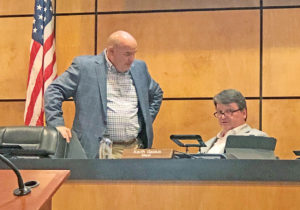

Columbus City Council heard from two people who hold two very different opinions on medical marijuana during its Tuesday night meeting.
Columbus Municipal School District Superintendent Cherie Labat urged the council to opt out of allowing medical marijuana facilities in the city limits, while businessman Terry Pittman said opting out would mean being left behind.
At its work session Thursday, City Attorney Jeff Turnage spoke to the council about the state’s medical marijuana program — approved by the legislature this year — that will allow dispensaries and facilities for growing and processing marijuana to set up shop. Local governments, such as cities and counties, have until May 3 to opt out, or they will automatically be enrolled in the program.
Columbus Light and Water Department General Manager Angela Verdell said grow houses, especially, would produce a much-needed revenue stream for the utility, and Building Official Kenny Wiegel said the city would likely need new zoning for those facilities.
Tuesday, Labat told the council she thought the city should opt out to better protect school children from possible exposure to marijuana.
“I’m not opposed to the use of medical marijuana for health issues when it is prescribed by a doctor and distributed by a pharmacist,” she said. “The new state law is the modern prohibition that allows medical marijuana in an open-entry market that will be distributed by distilleries (sic), by people who are not pharmacists.”
It will be hard to regulate the THC potency and distribution, Labat said, creating “gray lines for our children for recreational use.” She claimed edible forms of medical marijuana were “children-friendly” and would create “unforeseen issues” that would expose children to marijuana.
“I respectfully ask that we opt out to allow more time for us to evaluate the law and recalibrate how we can make this law work for the greater good of Columbus,” she said. “The law has gray areas that need to be addressed before we take a large step into the unknown.”
She asked the city to enact its own “protective clauses” to limit grow houses and dispensaries.
“Maximize the 1,000 feet proximity of distilleries (sic) to schools and other high density areas with children,” she said. “I also ask that we do not allow advertisement in the city limits. … Once we take a step forward, with this law, we can’t step back. We have too much to lose if we get it wrong.”
The law requires at least a 1,000-foot buffer between marijuana facilities and schools, day care centers and churches. It allows that to be reduced to 500 feet with a waiver.
Pittman, who said he is interested in getting into the medical marijuana business himself, offered a different perspective.
“With all due respect to Dr. Labat, this (medical marijuana bill) is 450 pages long,” he said. “Everything she just brought up is covered in this right here.”
For instance, there are already restrictions on age and on advertising, he said.
“You’ve got to be 21 years old to get a medical marijuana card,” he said. “The impact to our students, I don’t see where there is any. You can’t advertise.”
Children can be prescribed medical marijuana under Mississippi’s law, but only caregivers can fill prescriptions for it. Advertising is also very tightly regulated.
“This probably is the most regulated, restricted bill to ever come through Jackson,” Pittman said. “… If you read through this thing, all the regulations will blow you away.”
The tide on marijuana is turning, he said, and the city needs to position itself to take advantage of the changing times.
“In a certain sense, the prohibition of marijuana is over,” he said. “It’s coming, and you can accept it or not. Two or three weeks ago, the U.S. House passed a bill to legalize marijuana (on a federal level). It’s coming, and it’s not turning around.”
The city risks being left behind if it opts out, Pittman said.
“The people that are wanting to get into this business, the serious people, they’re already building out,” he said. “The people who want to get in this business, they’re doing it right now. If you opt out, you’re passing up this first run. The business people aren’t going to wait around. … I can promise you that Starkville and West Point (which have not opted out) are praying you opt out.”
Ward 2 Councilman Joseph Mickens was the only council member to ask questions, and he focused on Pittman.
“Listening to you talk, I’m not hearing nothing about the effect on the people in the community or our children,” Mickens said. “That’s the main thing. It’s about the kids. What are we introducing into our community? … Just because it’s nationwide don’t make it right.”
“(Kids) can’t even walk in the door,” Pittman said. “They can’t even get in the dispensary.”
Mickens said that other people could buy it for them.
“We can’t control that,” Pittman said. “It’s not walking in a candy store, I promise you that.”
.image-wrap { margin-bottom:2rem;
}
.image-wrap img {
width:100%;
} .slider{ max-width:750px;
}
.slider .image-caption { margin:.5rem 0 1rem;
}

